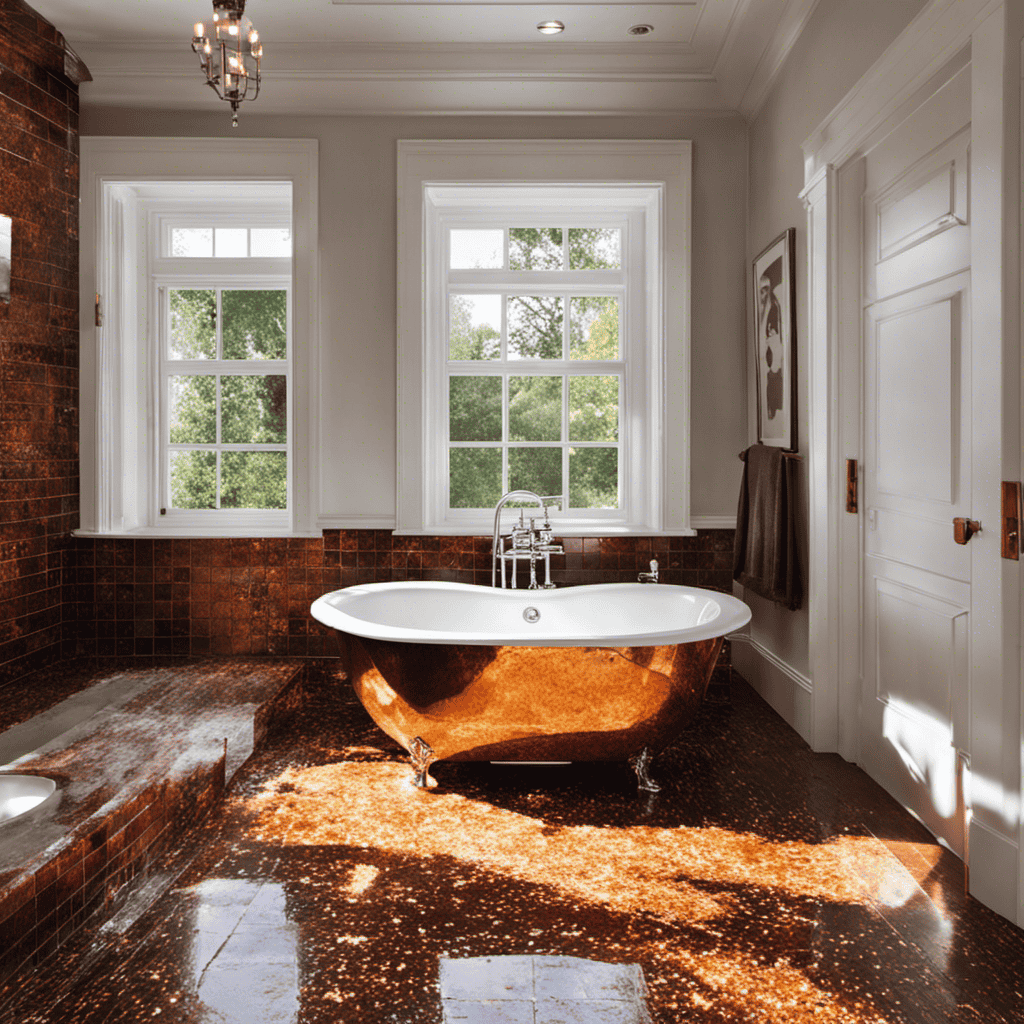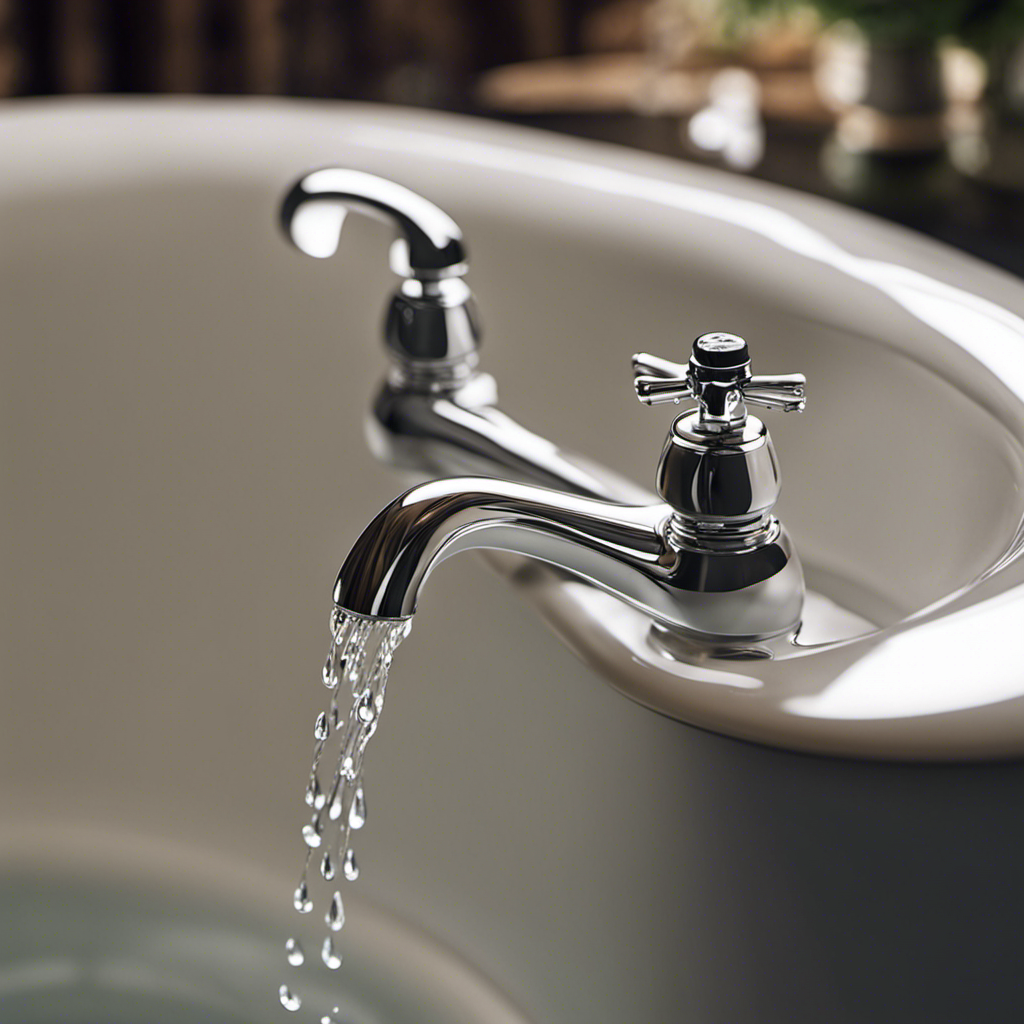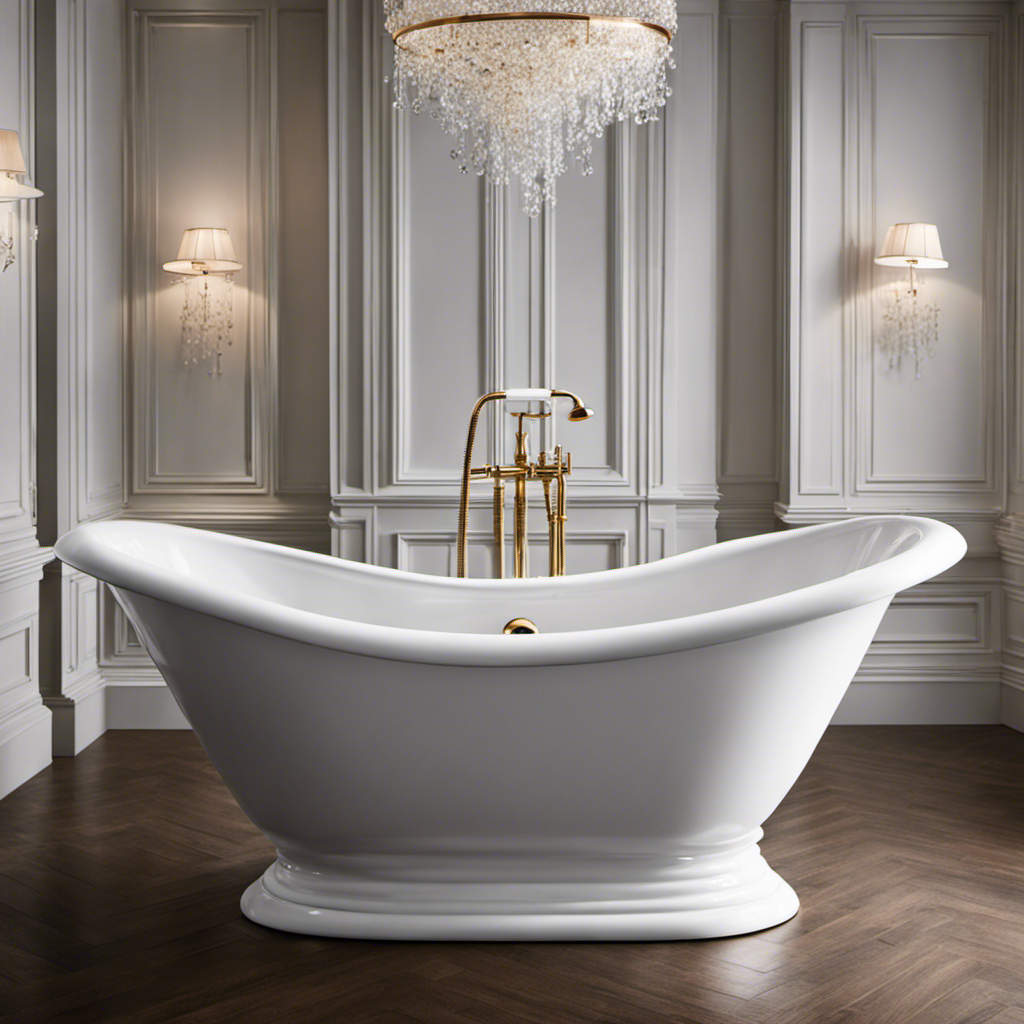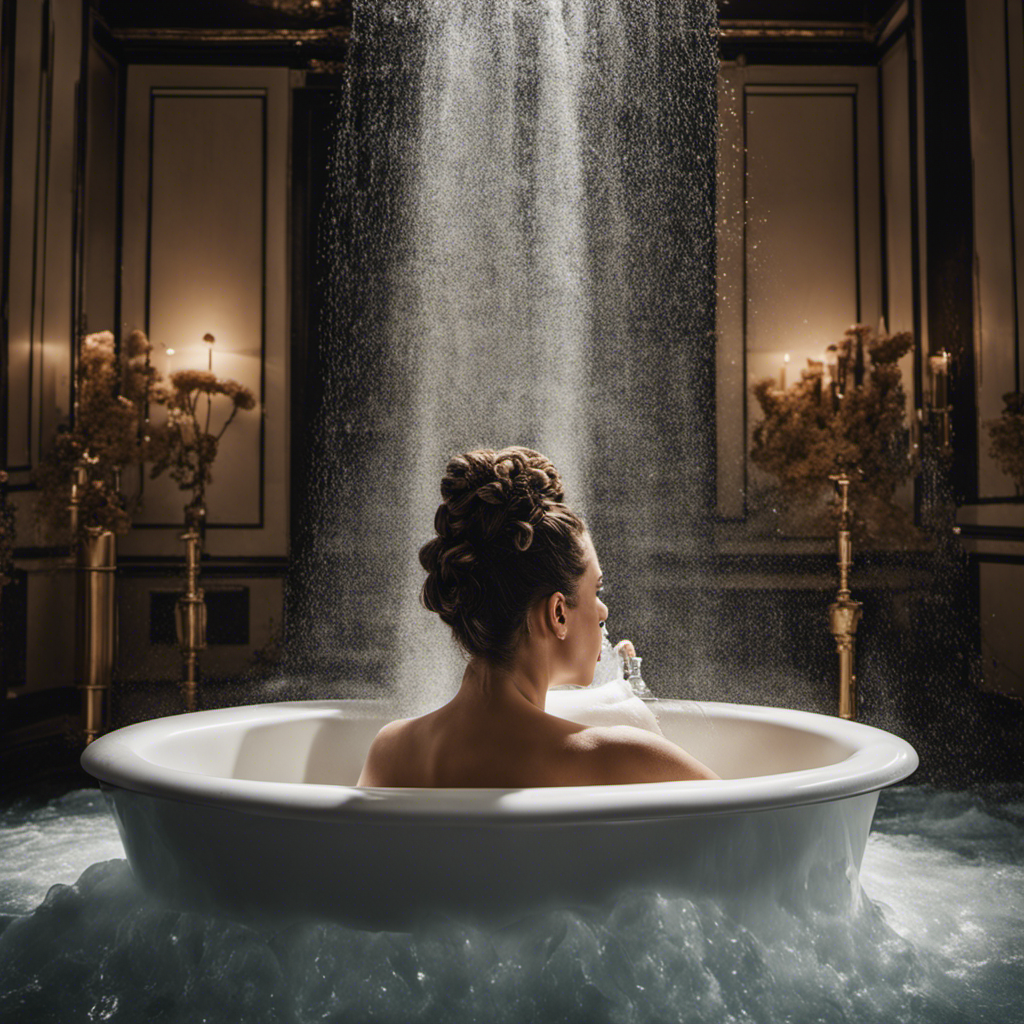Did you know that rust stains in bathtubs are a common problem that many people face? If you’re tired of seeing those unsightly stains every time you step into your bathroom, then this article is for you.
We’ll provide you with practical and detailed steps on how to get rid of those stubborn rust stains and restore the cleanliness and shine of your bathtub.
With a few simple supplies and some elbow grease, you’ll have your bathtub looking brand new in no time.
Key Takeaways
- Rust stains in bathtubs are caused by the presence of iron in the water supply.
- Investing in a water softener or filtration system can help reduce iron content in the water supply.
- Lemon juice, vinegar, and baking soda mixed with water are effective options for rust stain removal.
- Regular cleaning and drying of the bathtub can help prevent rust stains from recurring.
Understanding the Causes of Rust Stains in Bathtubs
Rust stains in your bathtub are typically caused by the presence of iron in your water supply. When water containing iron comes into contact with the surface of your bathtub, it oxidizes and forms rust stains. Other bathroom fixtures, such as shower curtains, can also be affected by these stains.
To understand how to remove these stains effectively, it is important to first determine the cause. If your water supply contains high levels of iron, investing in a water softener or a filtration system can help reduce the iron content and prevent future stains.
Additionally, regular cleaning and maintenance of your bathroom fixtures can help remove existing rust stains. For shower curtains, soaking them in a mixture of vinegar and water or using commercial rust stain removers can be effective in getting rid of the stains.
Preparing the Necessary Supplies for Rust Stain Removal
To effectively remove rust stains from your bathtub, start by gathering all the supplies you’ll need. There are several rust stain removal techniques you can try, but it’s important to have the right tools and solutions on hand to ensure success.
First, gather a scrub brush or sponge, a rust stain remover specifically designed for bathtubs, white vinegar, baking soda, and a lemon. These items will help you tackle the rust stains effectively.
For preparing rust stain removal solutions, mix equal parts of white vinegar and water in a spray bottle. You can also create a paste by combining baking soda and lemon juice. Both solutions work wonders in removing rust stains.
Having these supplies ready will make the process smoother and more efficient.
Using Natural Remedies to Remove Rust Stains From Bathtubs
When it comes to removing rust stains from your bathtub, natural remedies can be quite effective.
One option is using lemon juice, which contains citric acid that can help break down the rust. Simply squeeze a lemon and apply the juice directly onto the stain, letting it sit for a few minutes before scrubbing with a sponge or brush.
Another natural remedy that works well is baking soda. Mix it with water to create a paste and apply it to the stain, allowing it to sit for a while before scrubbing. The gentle abrasiveness of the baking soda can help lift the rust off the surface of your bathtub.
Lemon Juice Effectiveness
You’ll find that using lemon juice is a highly effective method for removing those stubborn rust stains from your bathtub. Not only does lemon juice have natural cleaning properties, but it’s also safe to use and doesn’t contain any harsh chemicals.
However, if you don’t have lemon juice on hand, there are a few alternatives you can try. Vinegar is one option, as it also has acidic properties that can help break down rust stains. Another alternative is hydrogen peroxide, which can be effective at removing rust.
When applying lemon juice to the rust stains, you’ll want to squeeze fresh lemon juice onto a cloth or sponge and then scrub the affected area. Let the lemon juice sit for a few minutes before rinsing it off. Repeat the process if necessary until the rust stains are completely gone.
Baking Soda Application
Mixing baking soda with water to create a paste is an effective way to remove rust stains from your bathtub. Baking soda is a versatile cleaning agent that is gentle on surfaces. Here’s how to use it:
-
Create the paste: In a small bowl, mix equal parts baking soda and water until it forms a thick paste.
-
Apply the paste: Using a sponge or cloth, spread the baking soda paste onto the rusted areas of your bathtub.
-
Let it sit: Allow the paste to sit on the stains for about 15-20 minutes. This will give the baking soda time to break down the rust.
-
Scrub and rinse: After the paste has soaked, scrub the rusted areas using a scrub brush or sponge. Rinse thoroughly with water.
Baking soda benefits include its mild abrasive properties, which help to gently remove rust stains without damaging the surface. It is also an eco-friendly alternative to harsh chemical cleaners.
Give this baking soda method a try and say goodbye to those stubborn rust stains!
Applying Commercial Rust Stain Removers to the Bathtub
To effectively remove rust stains from your bathtub, it’s important to apply a commercial rust stain remover according to the product’s instructions. Commercial rust stain removers are specially formulated to tackle tough rust stains and are often more effective than home remedies. While home remedies like vinegar can be effective in some cases, they may not be as powerful or reliable as commercial products.
Here is a table comparing the effectiveness of commercial rust stain removers and vinegar as rust stain removers:
| Commercial Rust Stain Removers | Vinegar | |
|---|---|---|
| Strength | Strong | Moderate |
| Effectiveness | Highly effective | Effective |
| Ease of use | Simple and straightforward | Simple |
As you can see, commercial rust stain removers are stronger and more effective than vinegar. They are designed to target rust stains specifically and offer a simple and straightforward solution for removing them from your bathtub.
Scrubbing and Brushing Techniques for Rust Stain Removal
When it comes to removing rust stains from your bathtub, you may be wondering which methods are the most effective.
One option to consider is using lemon juice, which has natural acidic properties that can help break down the rust.
Another popular choice is vinegar, which also contains acid and can be used as a cleaning agent.
Lastly, you’ll want to choose the best scrubbing tools for the job, such as a scrub brush or sponge, to ensure that you can effectively remove the rust stains.
Lemon Juice Effectiveness
Using lemon juice is an effective way to remove rust stains from your bathtub. Not only is it a natural and non-toxic alternative to harsh chemical cleaners, but lemon juice also contains citric acid, which helps to break down and dissolve rust.
Here are some key points to consider when using lemon juice for rust stain removal:
-
Lemon juice alternatives: If you don’t have lemon juice on hand, you can also try using vinegar or baking soda mixed with water as alternatives. Both of these ingredients have acidic properties that can help to remove rust stains.
-
Lemon juice and rust prevention: After removing the rust stains, it’s important to take steps to prevent them from coming back. One way to do this is by regularly cleaning and drying your bathtub to prevent moisture buildup, which can lead to rust formation.
-
Lemon juice application: To use lemon juice for rust stain removal, simply cut a lemon in half and squeeze the juice onto the stained area. Let it sit for a few minutes, then scrub the area with a brush or sponge. Rinse thoroughly with water.
-
Repeat if necessary: For stubborn rust stains, you may need to repeat the lemon juice application and scrubbing process multiple times until the stain is fully removed.
Vinegar Vs. Baking Soda
Now that you know about the effectiveness of lemon juice in removing rust stains from your bathtub, let’s explore another powerful solution: vinegar.
Vinegar is a versatile household ingredient that offers numerous benefits when it comes to cleaning. Its acidic nature makes it an excellent rust stain remover. To use vinegar, simply soak a cloth or sponge in it and apply it directly to the affected area. Let it sit for a few minutes, then scrub gently. Vinegar not only removes rust stains effectively, but it also leaves your bathtub sparkling clean.
If you don’t have vinegar on hand or prefer to try alternative methods, baking soda is a great option. Baking soda is a mild abrasive that can help lift rust stains from the surface of your bathtub. Make a paste by mixing baking soda with water, then apply it to the stains. Let it sit for a few minutes before scrubbing with a sponge or brush. Baking soda is gentle yet effective, making it a suitable alternative for removing rust stains from your bathtub.
Best Scrubbing Tools?
To effectively remove rust stains from your bathtub, the best scrubbing tools to consider are a sponge, a brush, or a scrubbing pad. These tools will help you tackle the stains with ease and efficiency.
Here are four key factors to consider when choosing the best scrubbing tools for rust stain removal:
-
Material: Opt for a sponge or brush with bristles made of nylon or polyester. These materials are durable and effective at removing tough stains without damaging the surface of your bathtub.
-
Size and shape: Select a scrubbing tool that fits comfortably in your hand and has a shape that allows you to reach all the nooks and crannies of your bathtub.
-
Stiffness: Look for a tool with bristles or a scrubbing pad that is firm enough to remove the rust stains effectively but not too abrasive to avoid scratching the bathtub surface.
-
Versatility: Consider a multi-purpose scrubbing tool that can be used for other cleaning tasks as well, such as cleaning tiles or sinks.
Soaking and Soaking Methods for Stubborn Rust Stains
If you want to tackle stubborn rust stains in your bathtub, try soaking it with a mixture of vinegar and baking soda. This method is effective in deep cleaning and removing rust stains, while also preventing future rust formation. Here’s a practical and detailed guide on how to soak your bathtub:
- Mix equal parts of vinegar and baking soda in a bowl or spray bottle.
- Apply the mixture directly to the rust stains, ensuring they are fully covered.
- Let the mixture sit for at least 30 minutes, allowing it to penetrate the rust and break it down.
- Use a scrub brush or sponge to gently scrub the stains in circular motions.
- Rinse the bathtub thoroughly with water to remove any residue.
- For extra rust prevention, consider applying a rust inhibitor or coating to the cleaned areas.
By following this soaking method, you can effectively remove stubborn rust stains from your bathtub and keep it looking clean and rust-free. Remember to always wear gloves and ensure proper ventilation when working with vinegar. Happy cleaning!
| Soaking Method | Steps | Benefits |
|---|---|---|
| Vinegar and | 1. Mix vinegar and baking soda | – Deep cleans rust stains |
| Baking Soda | 2. Apply mixture to stains | – Prevents future rust formation |
| 3. Let it sit for 30 minutes | – Easy to use and cost-effective |
Preventing Future Rust Stains in the Bathtub
One way to avoid future rust buildup in your tub is by regularly wiping it dry after each use. This simple step can go a long way in preventing future rust stains. Here are four effective techniques you can incorporate into your routine to keep your bathtub rust-free:
-
Use a squeegee: After each use, use a squeegee to remove any water droplets from the tub’s surface. This will prevent water from sitting on the surface and causing rust to form.
-
Apply a rust preventive coating: Consider applying a rust preventive coating to your bathtub. These coatings create a protective barrier that prevents moisture from coming into contact with the metal, reducing the chances of rust formation.
-
Keep the bathroom well-ventilated: Proper ventilation is crucial in preventing rust stains. Make sure your bathroom is well-ventilated to reduce humidity levels and prevent moisture buildup.
-
Address any leaks promptly: Leaks can lead to water pooling in your bathtub, which can accelerate rust formation. Fix any leaks as soon as you notice them to prevent future rust stains.
By implementing these rust stain prevention techniques, you can maintain a clean and rust-free bathtub for years to come.
In the next section, we will discuss how to deal with rust stains in hard-to-reach areas of the bathtub.
Dealing With Rust Stains in Hard-To-Reach Areas of the Bathtub
Are stubborn rust stains ruining the appearance of your bathtub? Don’t worry, there are effective methods to remove those stubborn rust stains and prevent future rust buildup.
In this discussion, we will explore practical techniques to eliminate those unsightly stains and provide you with tips to ensure your bathtub stays rust-free in the future.
Removing Stubborn Rust Stains
To remove stubborn rust stains from your bathtub, you’ll need some vinegar and baking soda. Here’s a step-by-step guide to help you tackle those pesky stains:
-
Gather your supplies: vinegar, baking soda, a scrub brush, and a cloth.
-
Mix equal parts vinegar and baking soda to form a paste.
-
Apply the paste directly to the rust stains and let it sit for about 10 minutes.
-
Scrub the stains using a scrub brush or cloth, applying gentle pressure.
-
Rinse the area with water and repeat the process if necessary.
If you’re looking for alternatives to lemon juice, you can try using white vinegar or hydrogen peroxide. These are effective in removing rust stains as well. However, for more severe or persistent rust stains, it may be best to consult a professional rust stain removal service.
Preventing Future Rust Buildup
To prevent future rust buildup in your bathtub, regularly clean and dry the surface after each use. Rust prevention techniques are essential for maintaining the appearance and longevity of your bathtub.
After each use, wipe down the surface with a soft cloth or sponge to remove any excess water or soap residue. This will help prevent the formation of rust stains. Additionally, consider using a mild detergent or vinegar solution to further clean the surface and remove any lingering mineral deposits.
For long-term rust stain solutions, you can apply a protective coating or sealant to the bathtub surface. This will create a barrier against moisture and prevent rust from forming. Remember to reapply the coating periodically to ensure continued protection.
Removing Deep-Set Rust Stains From the Bathtub Surface
Start by applying a paste made of vinegar and baking soda to the deep-set rust stains on your bathtub surface. This powerful combination will help break down the rust and make it easier to remove.
Here are four additional techniques you can try to effectively remove deep-set rust stains from your bathtub:
-
Lemon juice and salt: Squeeze fresh lemon juice onto the rust stain and sprinkle salt over it. Let it sit for a few hours before scrubbing it off with a brush.
-
Oxalic acid: This chemical compound is commonly found in commercial rust removers. Follow the instructions on the product label and use it to treat the rust stains on your bathtub.
-
Hydrogen peroxide and cream of tartar: Mix these two ingredients into a paste and apply it to the rust stains. Let it sit for a few minutes before scrubbing it off.
-
Professional rust stain removers: If all else fails, consider using a professional rust stain remover specifically designed for bathtubs. Follow the instructions carefully and test it on a small area before applying it to the entire stain.
Restoring the Shine and Cleanliness of the Bathtub After Rust Stain Removal
Now that you’ve successfully removed those deep-set rust stains from your bathtub, it’s time to restore its shine and cleanliness.
To bring back the luster of your tub, you can use a non-abrasive bathtub cleaner and a soft cloth or sponge. Apply the cleaner to the surface and scrub gently in circular motions, paying extra attention to any remaining residue. Rinse thoroughly with warm water to remove all traces of the cleaner. For an extra shine, you can polish the surface with a dry microfiber cloth.
To prevent future rust stains, it’s important to keep your bathtub dry after each use. Wipe away any water or moisture with a towel or squeegee to prevent the formation of rust.
With these steps, your bathtub will be looking as good as new in no time.
Now, let’s move on to some maintenance tips to keep your bathtub free from rust stains.
Maintenance Tips to Keep Your Bathtub Free From Rust Stains
One way you can prevent future rust stains in your bathtub is by regularly drying it after each use. Here are some additional tips to help you keep your bathtub free from those pesky rust stains:
-
Apply a protective coating: Use a bathtub refinishing kit or a clear acrylic coating to create a barrier between the metal surfaces in your bathtub and water. This will help prevent rust from forming.
-
Clean regularly with non-abrasive cleaners: Regularly clean your bathtub with mild, non-abrasive cleaners to remove any dirt or grime that can lead to rust stains. Avoid using harsh chemicals or abrasive scrubbers, as they can damage the surface.
-
Use lemon juice: The acidity of lemon juice can help dissolve rust stains. Simply squeeze some lemon juice onto the stained area, let it sit for a few minutes, and then scrub with a sponge or brush.
-
Dry completely: After cleaning your bathtub, make sure to thoroughly dry it to prevent the accumulation of moisture. Moisture can speed up the formation of rust, so wipe down the tub with a towel or use a squeegee to remove any excess water.
Frequently Asked Questions
Can I Use the Same Methods to Remove Rust Stains From Other Surfaces Besides Bathtubs?
Yes, you can use the same methods to remove rust stains from sinks, toilets, or countertops. However, there are alternative methods to remove rust stains from surfaces other than bathtubs that you can try as well.
Are There Any Natural Remedies That Can Be Harmful to the Bathtub Surface?
To prevent rust stains from forming in the first place, there are alternative methods you can use. However, be cautious as some natural remedies can harm the bathtub surface.
How Long Should I Let the Natural Remedies or Commercial Rust Stain Removers Sit on the Rust Stains Before Scrubbing?
To effectively remove rust stains, let natural remedies or commercial rust stain removers sit on the rust stains for about 15-30 minutes. This allows them to penetrate and loosen the rust before scrubbing.
What Should I Do if the Rust Stains Are Not Completely Removed After Trying the Suggested Methods?
If the rust stains persist despite your efforts, don’t fret. There’s still hope for your bathtub. Try using a paste of baking soda and vinegar, or consider using a commercial rust remover specifically designed for bathroom surfaces.
Are There Any Specific Cleaning Products or Tools That Should Be Avoided When Removing Rust Stains From Bathtubs?
When removing rust stains from your bathtub, be cautious of specific cleaning products to avoid, such as bleach or ammonia, as they can damage the surface. Instead, use recommended tools like a scrub brush or a paste made of baking soda and vinegar.
Conclusion
In conclusion, removing rust stains from your bathtub can be a challenging task, but with the right techniques and supplies, it can be done effectively.
One interesting statistic to note is that according to a study conducted by a leading cleaning product company, over 70% of households struggle with rust stains in their bathrooms. This shows that you are not alone in facing this issue, and there are solutions available to help you restore the shine and cleanliness of your bathtub.
By following the steps outlined in this article, you can say goodbye to rust stains and enjoy a sparkling clean bathtub. Remember to regularly maintain your bathtub to prevent future rust stains.










